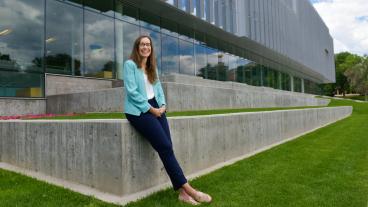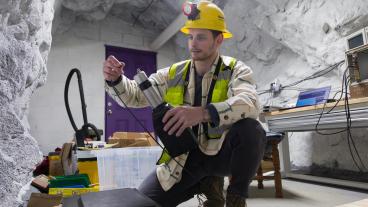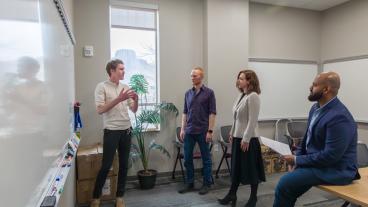Rockefeller data initiative aims to transform electricity systems
AMSTERDAM (June 18, 2019) – UMass Amherst, Columbia University, Carnegie Mellon University, Colorado School of Mines and The Rockefeller Foundation today announced the launch of the Electricity Growth and Use In Developing Economies (e-GUIDE) Initiative, an effort to apply data science to electricity demand prediction in energy-poor emerging economies.
The e-GUIDE Initiative is being funded through a $3.8 million grant from The Rockefeller Foundation, which has a dedicated focus on ending energy poverty and improving livelihoods by leveraging breakthroughs in data science and decentralized energy to both accelerate the pace of electrification and dramatically decrease the cost.
While there are a variety of advanced tools available in Europe and the United States to accurately estimate electricity demand, the tools, and methodologies needed to discover the best-fit methods for expanding access to reliable, affordable power in emerging markets are lacking.
The e-GUIDE Initiative will partner with electricity service providers across Sub-Saharan Africa and in Asia to enhance the data available for planning and operating their systems, and enabling the roll-out of integrated electrification strategies, especially in rural areas where unreliable demand prediction has hindered universal electrification efforts. 
The consortium is developing an openly available application programming interface (API) that will enable data and insights on electricity consumption growth to flow across borders and throughout the sector. The tool is powered by applying new machine learning techniques to geospatial data from satellites in conjunction with real electricity billing and consumption data from hundreds of thousands of emerging market commercial and residential customers.
“Better electricity consumption predictions enable clear-eyed, informed planning of future electricity systems,” said Jay Taneja of UMass Amherst’s department of Electrical and Computer Engineering, and the project lead. “If you can’t measure it, you can’t manage it. Better data helps governments and international donors to better direct investments to expand electricity access and grow emerging economies.”
Ashvin Dayal, Associate Vice President and Managing Director of The Rockefeller Foundation’s Power Initiative said: “Increasingly, actors across the electrification ecosystem – from planners to investors to utilities and project developers – need to better understand how electricity consumption will evolve as they work to integrate the most appropriate mix of grid and off-grid technologies. In the context of the 21st century we can’t end poverty without ending energy poverty, and e-GUIDE has the potential to dramatically improve our understanding of the under-served electricity consumer and spur a new wave of innovation to reach hundreds of millions of people more quickly than would otherwise be the case.”
Indeed, the ability to accurately predict energy demand is critical for grid-expansion in energy-poor areas. “Of the nearly 1 billion estimated to not have electricity access most are within the service territories of electric utilities whose finances frequently preclude them from generating the internal resources to invest in new access, maintenance and upgrades to their grid network,” said Vijay Modi at Columbia University’s Department of Mechanical Engineering.
“For many countries in Sub-Saharan Africa the task would be near impossible without external loans that are a scarce and precious commodity. e-GUIDE will contribute towards shaping prudent cost-effective investment decisions, shaping grid roll-out to areas with a high potential for income generation that will be win-win: for people’s livelihoods and the utilities.”
Intelligence and analysis at the center will also support coordinated investments at the nexus of the electricity and agriculture sectors. Paulina Jaramillo of Carnegie Mellon University’s Department of Engineering and Public Policy and Co-Director of the Green Design Institute noted that “In Sub-Saharan Africa almost 20% of cereals produced and nearly 50% of all fruits and vegetables are lost before reaching consumers.
We believe that finding opportunities for coordinated energy-agriculture investments can simultaneously increase the efficiency of the agricultural supply chain, increase revenues for electricity utilities in dire need of sustainable business models, and support development and human well-being.”
Even in areas with grid connectivity in emerging economies, electricity is often unreliable. Including data on reliability in their models, the e-GUIDE team hopes to inform the sector and help it address current shortcomings. “What is the first sign that the power has been cut? The lights go out,” said Christopher Elvidge, Director of The Payne Institute for Public Policy’s Earth Observation Group at Colorado School of Mines. “We are developing methods for rating the reliability of electric power services using nightly satellite observations on electric lighting. We plan to develop national level maps showing the frequency of electric power disruptions.”
To ensure that the tools and methods developed by the project have a long term and sustainable impact, the Initiative is also engaging with companies and public institutions to improve data analytics capacity within the electricity sector in sub-Saharan Africa, through Carnegie Mellon University’s campus in Kigali, Rwanda. “e-GUIDE is supporting internships for graduate students who come from across the continent to train young professionals to address critical challenges within the sector,” said Nathan Williams at CMU’s Department of Engineering and Public Policy. “We are also providing support to mid-career professionals to develop data analytics skills through participation in the yearlong Africa Industrial Internet Programme at the African Leadership University. These programs will help to fill critical skills gaps within the sector.”
e-GUIDE is set to become a global center for collaborative engagement across the sector, fundamentally altering the ways in which governments and companies plan and roll out electrification at the national level. To find out more visit: www.rockefellerfoundation.org/e-guide.
About UMass Amherst and the Systems Toward Infrastructure Measurement and Analytics Lab
The University of Massachusetts Amherst, founded in 1863, is the flagship of the five-campus UMass system. Home to the Commonwealth Honors College, UMass Amherst incorporates modern teaching methods involving new communication and information technology, yet remains an immersive, residential campus serving more than 22,000 undergraduate and approximately 6,300 graduate students across a comprehensive array of academic programs.
True to its land-grant roots, UMass Amherst is engaged in research and creative work in all fields and is classified by the Carnegie Foundation for the Advancement of Teaching as a doctoral university with the “highest research activity” or R1. Major areas of emphasis include climate science, food science, alternative energy, nanomanufacturing, polymer science, computer science and linguistics.
The Systems Toward Infrastructure Measurement and Analytics (STIMA) laboratory at UMass Amherst studies infrastructure in the developed and developing world, including energy and building systems, but also transportation, water, and sanitation systems. The laboratory uses embedded and mobile devices, machine learning, and controls.
About Columbia University and the Quadracci Sustainable Engineering Laboratory
Among the world’s leading research universities, Columbia University in the City of New York continually seeks to advance the frontiers of scholarship and foster a campus community deeply engaged in understanding and confronting the complex issues of our time through teaching, research, patient care and public service. The University is comprised of 16 undergraduate, graduate and professional schools, and four affiliated colleges and seminaries in Northern Manhattan, as well as a wide array of research institutes and global centers located in major cities around the world. More than 40,000 accomplished students, award-winning faculty and professional staff define the University’s underlying values and commitment to pursuing new knowledge and educating informed, engaged citizens. Founded in 1754 as King’s College, Columbia is the fifth oldest institution of higher learning in the United States. The Quadracci Sustainable Engineering Laboratory (qsel) was formed to study last-mile service delivery under the aegis of the School of Engineering and the Earth Institute. Some recent projects: Digital payment and control systems for irrigation, Acacia; for micro-grids, Sharedsolar; tools such as Formhub and NetworkPlanner; research on the decarbonization of electricity and building systems; leveraging lean measurement and data analytics for utilities.
About the College of Engineering at Carnegie Mellon University & The Green Design Institute
The College of Engineering at Carnegie Mellon University (CMU) is a top-ranked engineering college that is known for our intentional focus on cross-disciplinary collaboration in research. The College is well-known for working on problems of both scientific and practical importance. Our “maker” culture is ingrained in all that we do, leading to novel approaches and transformative results. Our acclaimed faculty have a focus on innovation management and engineering to yield transformative results that will drive the intellectual and economic vitality of our community, nation, and world. At CMU-Africa in Kigali, Rwanda, the College delivers two academic programs aimed at training the next generation of leaders. The Green Design Institute (GDI) at CMU seeks to conduct, foster, and promote research pertaining to infrastructure and systems growth in the developing world.
About Colorado School of Mines & The Payne Institute for Public Policy
Colorado School of Mines is a public university focused on science and engineering, dedicated to educating and inspiring students, advancing knowledge, and innovating to address the great challenges society faces today—particularly those related to earth, energy and the environment. For more information, go to mines.edu.
The Payne Institute for Public Policy at Colorado School of Mines leverages the university’s world-class education and research in engineering and science related to earth, energy and the environment to produce interdisciplinary, data-driven answers to difficult policy questions. For more information, visit payneinstitute.mines.edu.
About The Rockefeller Foundation
The Rockefeller Foundation advances new frontiers of science, data, policy and innovation to solve global challenges related to health, food, power and economic mobility. As a science-driven philanthropy focused on building collaborative relationships with partners and grantees, the Foundation seeks to inspire and foster large-scale human impact that promotes the well-being of humanity throughout the world by identifying and accelerating breakthrough solutions, ideas and conversations. For more information, visit rockefellerfoundation.org.
CONTACT
Emilie Rusch, Public Information Specialist, Colorado School of Mines | 303-273-3361 | erusch@mines.edu
Eric Gay, The Rockefeller Foundation | 917-912-6190 | egay@rockfound.org



